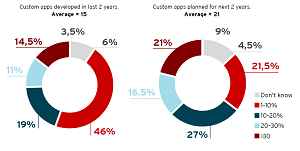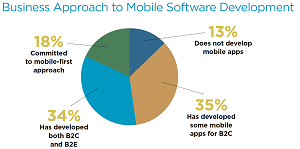News
Despite Mobile App Demand, Enterprise Spending Lags, Research Indicates
- By David Ramel
- June 23, 2016
Despite the much-publicized demand for mobile app development in the enterprise, spending for such initiatives remains low, according to a new report from research firm Gartner Inc. that parallels the findings of many other studies.
"Demand for mobile apps in the enterprise is growing, but the urgency to scale up mobile app development doesn't yet appear to be a priority for most organizations," said Adrian Leow, principal research analyst at Gartner. "This must change, particularly given employees often have the autonomy to choose the devices, apps and even the processes to complete a task. This places an increasing amount of pressure on IT to develop a larger variety of mobile apps in shorter time frames."
Just the week before, Gartner weighed in with other research that indicated the demand for enterprise mobile apps will outstrip available development capacity five to one. "Organizations increasingly find it difficult to be proactive against competitive pressures, which is resulting in their mobile apps becoming tactical, rather than strategic," Leow said in that note. "We're seeing demand for mobile apps outstrip available development capacity, making quick creation of apps even more challenging. Mobile strategists must use tools and techniques that match the increase in mobile app needs within their organizations."
In this week's report, Gartner said the percentage of enterprise application development budgets devoted to mobile has actually decreased from last year, although 42 percent of organizations said they'll increase spending on mobile development by an average of 31 percent this year. Overall, mobile accounts for only about 10 percent of total organizational development budgets, Gartner said.
These confounding, non-intuitive statistics echo the findings from many earlier studies.
Earlier this year, for example, Red Hat Inc. published survey results gauging the state of mobile maturity in 2015.
"Over the last two years, almost half of the organizations surveyed (52 percent) had developed fewer than 10 custom mobile apps, with 45 percent creating more than 10," the Red Hat survey said. "Despite the hype surrounding mobile and opportunities for custom apps to enable greater workforce productivity and enhanced customer engagement, the number of custom apps created is low."
 [Click on image for larger view.]
Custom App Development Is Low, But Growing (source: Red Hat)
[Click on image for larger view.]
Custom App Development Is Low, But Growing (source: Red Hat)
Last fall, a study from Accenture indicated that executives are aware of the importance of enterprise mobile apps, but few organizations are following through to take full advantage of their mobile investments. The study found that the large majority of 1,925 decision-makers surveyed "recognize the value of mobile apps for their business (87 percent), but very few are well prepared to successfully deploy and maintain those apps."
Telerik by Progress came out with its own research that indicated a surprisingly slow adoption of mobile development despite all the hype about smartphone apps and enterprise mobility. "The most poignant finding of the survey is that 57 percent of developers have never built a mobile app, indicating that mobile app development remains highly specialized," said a spokesperson in a statement about the survey.
A Forrester Consulting study commissioned by IBM last November examined the issue of what makes a great mobile app and also revealed the same trend as the others. The report found that while many organizations produce much hoopla about the importance of apps and their keen interest in capitalizing on enterprise mobility, their money spent doesn't match up to the words vocalized.
Yet another survey by OutSystems in 2014 indicated that enterprise developers were even back then having a tough time keeping up with the demand for mobile apps in the new "mobile-first" era. The primary problems were said to be budget, time and a shortage of mobile developers, which have led to most organizations having a significant backlog of projects awaiting completion.
Not all research supports the aforementioned conclusions, however. The non-profit Application Developers Alliance (ADA) published a study last September that showed a strong mobile focus among developers. "Mobile is the new norm with 87 percent of developers engaged in mobile software development," the report said. Despite that finding, the ADA research indicated 13 percent of respondent organizations don't develop mobile apps at all, though 18 percent claimed they were committed to a mobile-first approach. That research definitely offers a contrarian view, however.
 [Click on image for larger view.]
13 Percent of Organizations Report No Mobile Development (source: Application Developers Alliance)
[Click on image for larger view.]
13 Percent of Organizations Report No Mobile Development (source: Application Developers Alliance)
In fact, an earlier Gartner report, along with a study commissioned by Kony Inc., indicated enterprises were struggling to meet the demand for mobile apps, which led many to outsource the work.
"IT departments are ill-equipped to meet the demand for mobile apps due to budget and resourcing limitations, skills gap, legacy infrastructure, overall technology fragmentation and immature lifecycle workflows," the Kony report said. "As a result, many companies are looking to external resources to meet business demand for mobile apps."
Gartner's earlier report echoed the same findings. "Organizations want to have full control over their mobile app development initiatives, however, maintaining a pure in-house development environment is difficult to achieve given mobile is a relatively new competency to many developers," Gartner said at the time. "It entails many complexities and specific activities, such as UX design and psychology or cellular coverage testing, which may be more efficiently handled by an outsourced third party experienced in mobile app development."
Along with outsourcing mobile development, enterprises have also been turning to other strategies to meet app demand, such as leveraging the expanding universe of low-code tools designed to let ordinary business users -- or "citizen developers" -- create apps.
"There is an explosion of people trying to pick-up the programming out there, which helps this movement," IDC analyst Al Hilwa told ADTmag in an e-mail. "But generally, business users who discover an aptitude for app building tend to make a permanent shift to professional development over time."
"On the other hand," Hilwa continued, "all knowledge workers are using more data science and coding type activities in the mainstream work cycle than before, and many more are increasingly engaged in digital transformation as stakeholders in agile teams or business product managers. In the long run, more and more of the population will eventually engage in a level of app construction skills but for that to materially change, schools have to do a better job teaching app building."
Until then, organizations will likely continue to struggle to meet app demand and satisfy corporate "mobile-first" and "enterprise mobility" initiatives. Whether the non-intuitive, corresponding lack of investment in enterprise mobile development continues remains to be seen.
About the Author
David Ramel is an editor and writer at Converge 360.